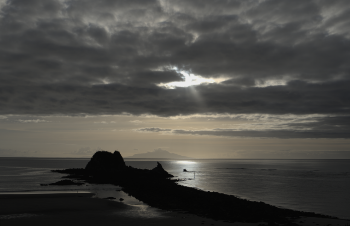
MANGAWHAI'S NO.1 NEWSPAPER
|
|
|
The Climate Chap: Oceans '23The Climate Chap 27 Mar, 2023
No, not the latest George Clooney and Brad Pitt movie – just an opportunity to consider the importance of oceans and their impact on our lives. The basics. Oceans cover 70 percent of the planet, and consist of over 96 percent of all water. Of the tiny percentage that’s not in oceans, about two percent is froze in glaciers and ice caps. Less than one percent of all the water on earth is fresh. Despite the endless storms over summer, only a tiny fraction of water exists as vapour in the atmosphere. We tend to take our oceans for granted. Mangawhai remains one of the best “coastal” communities around mainly due to access to our wonderful beaches and estuary. Whether we are into fishing, surfing, boating, jet skiing, beach walking whilst exercising the hound, or simply going for a splash, our lives would be poorer were we not to have such convenient access to our ocean. For many of us it’s simply there, and excluding the regular and predictable changes of tides does not appear to change from year to year. But courtesy of the climate crisis and associated planet warming, subtle changes are taking place with potentially massive repercussions. Why? Simply because as more and more greenhouse gases trap more energy from the sun, the oceans are absorbing more heat, resulting in an increase in sea surface temperatures and rising sea levels. Changes in ocean temperatures and currents will lead to alterations in climate patterns around the world. Oceans therefore play a significant role in climate dynamics, absorbing 93 percent of heat that accumulates in the earth’s atmosphere, and a quarter of the carbon dioxide (CO2) released from fossil fuels. The impacts of climate change on our oceans include shifts in temperature, acid levels, sea rises, oxygen levels and ocean currents. How much warmer are our oceans getting? Around 0.12C per decade, and rapidly rising. But wait I hear you say… surely that change is minimal and something that you could not possibly detect the next time you head into the water at the surf club? This warming has already resulted in the erosion of coral reefs in Australia and Polynesia, changes to fishing habitats and stocks, and impacts bird migration as access to nutrients in the water changes. Last year huge damage was caused to the King salmon business in Marlborough where stocks were massively depleted due to the warmth of the water. Birds such as the amazing albatross are having to travel further to forage. Climate change is causing sea levels to rise around New Zealand's coastline. Rising sea level is a cause of coastal erosion, which harms the habitats of shorebirds and other coastal dwellers, including people. Sadly 90 percent of native seabirds and shorebirds are now threatened. Food availability is shifting with the changes in ocean circulation, rising sea surface temperatures, and ocean acidification. It is inevitable that stocks will migrate to where ocean temperatures are cooler and constantly move to where nutrition becomes freely available. Despite being a vegetarian, there’s a silver lining for all you fish lovers – fishing has less impact on the climate than the harvesting of other proteins. Research suggests that each kilogram of fish caught produces between one and five kilograms of carbon. By comparison, red meat production is estimated to range from 50 to 750 kilograms of carbon per kilogram of meat. Best to catch or buy local fish so as to reduce the carbon generated when shipping food from overseas. Finally, from the perspective of sustainability, the ever-increasing presence of plastics, both in the oceans and in fish represents a massive and potentially catastrophic change to our oceans and the future of the fishing industry. Eight million pieces of plastic pollution find their way into our ocean daily. Pieces of plastic are sharp, brittle, toxic, and routinely found in the stomachs of dead fish, turtles, and marine mammals. Researchers have found plastic in the stomachs of 44 percent of all seabird species, 22 percent of cetacean species, and in all sea turtle species. It is estimated that up to about one million seabirds and 100,000 marine mammals die each year from ingesting plastic or by getting tangled in nylon fishing line, nets, six-pack plastic can holders, and plastic rope. Food for thought. Climate change is causing sea levels to rise around New Zealand's coastline. Coastal erosion harms the habitats of shorebirds and other coastal dwellers, including people. PHOTO/STEVE GREEN |

 OPINION
OPINION
